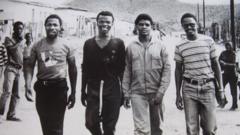In a landmark move, South Africa's President Cyril Ramaphosa has initiated a judicial inquiry into alleged political meddling that has hindered the prosecution of crimes committed during apartheid.
South Africa Launches Inquiry into Apartheid Prosecutions

South Africa Launches Inquiry into Apartheid Prosecutions
Judicial inquiry aims to address political interference in longstanding apartheid-era crime trials.
In a significant step towards justice three decades after the end of apartheid, South African President Cyril Ramaphosa has unveiled plans for a judicial inquiry focused on allegations of political interference that has long obstructed the prosecution of apartheid-era crimes. This revelation comes in response to a civil suit filed by a coalition of 25 families and survivors, claiming inadequacies in the government's response to dealing with atrocities committed during the apartheid regime.
The Truth and Reconciliation Commission (TRC), formed in 1996, previously exposed painful truths about the systemic violence of apartheid but resulted in very few prosecutions. Many victims' families continue to feel the pangs of injustice as prominent cases remain unresolved and their families' suffering largely unrecognized.
Ramaphosa's administration stated its commitment to uncover the facts and finalize the judicial matters, asserting that the inquiry is a response to claims that past administrations may have improperly influenced the investigations and prosecutions of those responsible for apartheid crimes. The inquiry derives from ongoing settlement negotiations related to the lawsuit seeking $9 million in damages, due to the perceived failures of successive governments to properly address historical injustices.
A notable plaintiff in the case is the son of Fort Calata, one of the "Cradock Four," who were brutally murdered by security forces during the apartheid struggle in 1985. Despite confessions from involved former police officers, the absence of legal repercussions remains a source of anger and disappointment. Critics have long accused the African National Congress (ANC) of reaching clandestine agreements with the former apartheid government that has disallowed thorough investigations and prosecutions, claims which the ANC has denied.
As South Africa prepares for this inquiry, the head and timeline for the investigation are set to be announced soon, offering a glimmer of hope for justice in cases that have haunted the nation for decades.
The Truth and Reconciliation Commission (TRC), formed in 1996, previously exposed painful truths about the systemic violence of apartheid but resulted in very few prosecutions. Many victims' families continue to feel the pangs of injustice as prominent cases remain unresolved and their families' suffering largely unrecognized.
Ramaphosa's administration stated its commitment to uncover the facts and finalize the judicial matters, asserting that the inquiry is a response to claims that past administrations may have improperly influenced the investigations and prosecutions of those responsible for apartheid crimes. The inquiry derives from ongoing settlement negotiations related to the lawsuit seeking $9 million in damages, due to the perceived failures of successive governments to properly address historical injustices.
A notable plaintiff in the case is the son of Fort Calata, one of the "Cradock Four," who were brutally murdered by security forces during the apartheid struggle in 1985. Despite confessions from involved former police officers, the absence of legal repercussions remains a source of anger and disappointment. Critics have long accused the African National Congress (ANC) of reaching clandestine agreements with the former apartheid government that has disallowed thorough investigations and prosecutions, claims which the ANC has denied.
As South Africa prepares for this inquiry, the head and timeline for the investigation are set to be announced soon, offering a glimmer of hope for justice in cases that have haunted the nation for decades.






















